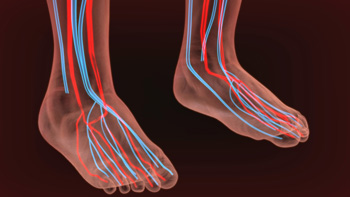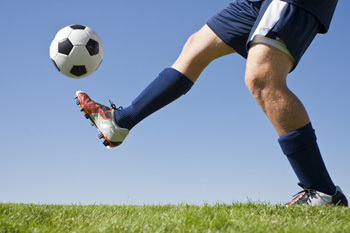6650 Frankford Ave
Philadelphia, PA 19135

Poor circulation in the feet refers to a condition where blood flow to the lower extremities is insufficient, resulting in various discomforts and potential health issues. It occurs when blood struggles to move freely through the blood vessels, leading to a lack of oxygen and nutrients in the feet. Several factors can contribute to poor circulation in the feet. One primary cause is atherosclerosis, where fatty deposits build up in the arteries, narrowing and hardening them. Diabetes can also lead to circulatory problems, damaging blood vessels and nerves in the feet. Blood clot formation, often in deep veins, which is known as deep vein thrombosis, also can obstruct circulation. Smoking, high blood pressure, and obesity are additional risk factors. Symptoms of poor circulation in the feet can range from tingling, numbness, and coldness to more severe complications such as ulcers and non-healing wounds. Early detection and proactive measures to improve circulation and maintain foot health can help. If you have symptoms of poor foot circulation, it is strongly suggested that you seek the counsel of a podiatrist who can determine the cause and offer appropriate treatment options.
While poor circulation itself isn’t a condition; it is a symptom of another underlying health condition you may have. If you have any concerns with poor circulation in your feet contact John M. Fanelly, DPM of Northeast Philadelphia. Our doctor will treat your foot and ankle needs.
Poor Circulation in the Feet
Peripheral artery disease (PAD) can potentially lead to poor circulation in the lower extremities. PAD is a condition that causes the blood vessels and arteries to narrow. In a linked condition called atherosclerosis, the arteries stiffen up due to a buildup of plaque in the arteries and blood vessels. These two conditions can cause a decrease in the amount of blood that flows to your extremities, therefore resulting in pain.
Symptoms
Some of the most common symptoms of poor circulation are:
Treatment for poor circulation often depends on the underlying condition that causes it. Methods for treatment may include insulin for diabetes, special exercise programs, surgery for varicose veins, or compression socks for swollen legs.
As always, see a podiatrist as he or she will assist in finding a regimen that suits you. A podiatrist can also prescribe you any needed medication.
If you have any questions, please feel free to contact our office located in Philadelphia, PA . We offer the newest diagnostic and treatment technologies for all your foot care needs.

Pregnancy is a joyous but challenging period, with an increased risk of falls affecting approximately one-third of expectant mothers. To reduce this risk, pregnant women may want to avoid slippery surfaces, use stair rails, opt for flatter shoes, and move at a measured pace. Engaging in regular physical activities, such as yoga or walking, has consistently shown to reduce the likelihood of falls. Research underscores the significance of maintaining ankle stiffness to prevent falls during pregnancy. A recent study revealed that women in their third trimester face challenges with postural equilibrium, detected through stability tests. Wearing a maternity support belt emerges as a practical solution, as it helps to enhance balance and reduce fall risk, especially in the later stages of pregnancy. In addition to these measures, maintaining a well-balanced diet and staying adequately hydrated contributes to overall health during pregnancy. Adequate fluid intake helps prevent dizziness and promotes joint flexibility, which further reduces the risk of accidental falls. By incorporating these lifestyle adjustments, expectant mothers can navigate the physical changes of pregnancy more safely and enjoy a healthier and stable journey into motherhood. For help in dealing with falls during pregnancy, it is suggested that you schedule an appointment with a podiatrist.
Pregnant women with swollen feet can be treated with a variety of different methods that are readily available. For more information about other cures for swollen feet during pregnancy, consult with John M. Fanelly, DPM from Northeast Philadelphia. Our doctor will attend to all of your foot and ankle needs.
What Foot Problems Can Arise During Pregnancy?
One problem that can occur is overpronation, which occurs when the arch of the foot flattens and tends to roll inward. This can cause pain and discomfort in your heels while you’re walking or even just standing up, trying to support your baby.
Another problem is edema, or swelling in the extremities. This often affects the feet during pregnancy but tends to occur in the later stages.
How Can I Keep My Feet Healthy During Pregnancy?
If you have any questions please feel free to contact our office located in Philadelphia, PA . We offer the newest diagnostic and treatment technologies for all your foot and ankle needs.

Proper foot care is essential for soccer players, as their feet are their primary tools on the field. Just like a carpenter maintains their tools, soccer players must take care of their feet to perform effectively. Parents whose children play soccer should regularly check their children's feet for any issues and teach them to promptly report any discomfort. Common foot issues in soccer players include abrasions, athlete's foot, blisters, calluses, and corns. Additionally, bruises, cysts, ingrown toenails, toenail loss may also become concerning foot conditions. Less common but serious issues like broken bones, bone bruises, bone spurs, and sprains should be treated by podiatrists promptly. If you are a parent or player, it is suggested that you schedule an appointment with a podiatrist in advance to ensure proper care, if needed.
Ankle and foot injuries are common among athletes and in many sports. They can be caused by several problems and may be potentially serious. If you are feeling pain or think you were injured in a sporting event or when exercising, consult with John M. Fanelly, DPM from Northeast Philadelphia. Our doctor will assess your condition and provide you with quality foot and ankle treatment.
Common Injuries
The most common injuries that occur in sporting activities include:
Symptoms
Symptoms vary depending upon the injury and in some cases, there may be no symptoms at all. However, in most cases, some form of symptom is experienced. Pain, aching, burning, bruising, tenderness, tightness or stiffness, sensation loss, difficulty moving, and swelling are the most common symptoms.
Treatment
Just as symptoms vary depending upon the injury, so do treatment options. A common treatment method is known as the RICE method. This method involves rest, applying ice, compression and elevating the afflicted foot or ankle. If the injury appears to be more serious, surgery might be required, such as arthroscopic or reconstructive surgery. Lastly, rehabilitation or therapy might be needed to gain full functionality in the afflicted area. Any discomfort experienced by an athlete must be evaluated by a licensed, reputable medical professional.
If you have any questions, please feel free to contact our office located in Philadelphia, PA . We offer the newest diagnostic and treatment technologies for all your foot care needs.

Foot surgery is a decision often made with the goal of alleviating persistent discomfort and enhancing overall foot health. One common reason to have foot surgery is the correction of structural abnormalities, such as bunions or hammertoes, which can cause pain and affect mobility. Surgical intervention may also be necessary to address severe cases of conditions like plantar fasciitis, where conservative treatments have proven insufficient. Removal of painful growths or deformities, such as cysts or bone spurs, is another motive for foot surgery. Injuries, such as fractures or torn ligaments, may require surgical repair to restore normal function. In some cases, joint fusion or replacement becomes a viable option for advanced arthritis. Surgical procedures tailored to specific needs can significantly improve quality of life, reduce pain, and restore mobility, allowing individuals to step into a future with greater comfort and functionality. If you have a specific foot condition and are considering surgery, it is strongly suggested that you are under the care of a podiatrist who can help you determine if this is a correct decision for you.
Foot surgery is sometimes necessary to treat a foot ailment. To learn more, contact John M. Fanelly, DPM of Northeast Philadelphia. Our doctor will assist you with all of your foot and ankle needs.
When Is Surgery Necessary?
Foot and ankle surgery is generally reserved for cases in which less invasive, conservative procedures have failed to alleviate the problem. Some of the cases in which surgery may be necessary include:
What Types of Surgery Are There?
The type of surgery you receive will depend on the nature of the problem you have. Some of the possible surgeries include:
Benefits of Surgery
Although surgery is usually a last resort, it can provide more complete pain relief compared to non-surgical methods and may allow you to finally resume full activity.
Surgical techniques have also become increasingly sophisticated. Techniques like endoscopic surgery allow for smaller incisions and faster recovery times.
If you have any questions please feel free to contact our office located in Philadelphia, PA . We offer the newest diagnostic and treatment technologies for all your foot and ankle needs.